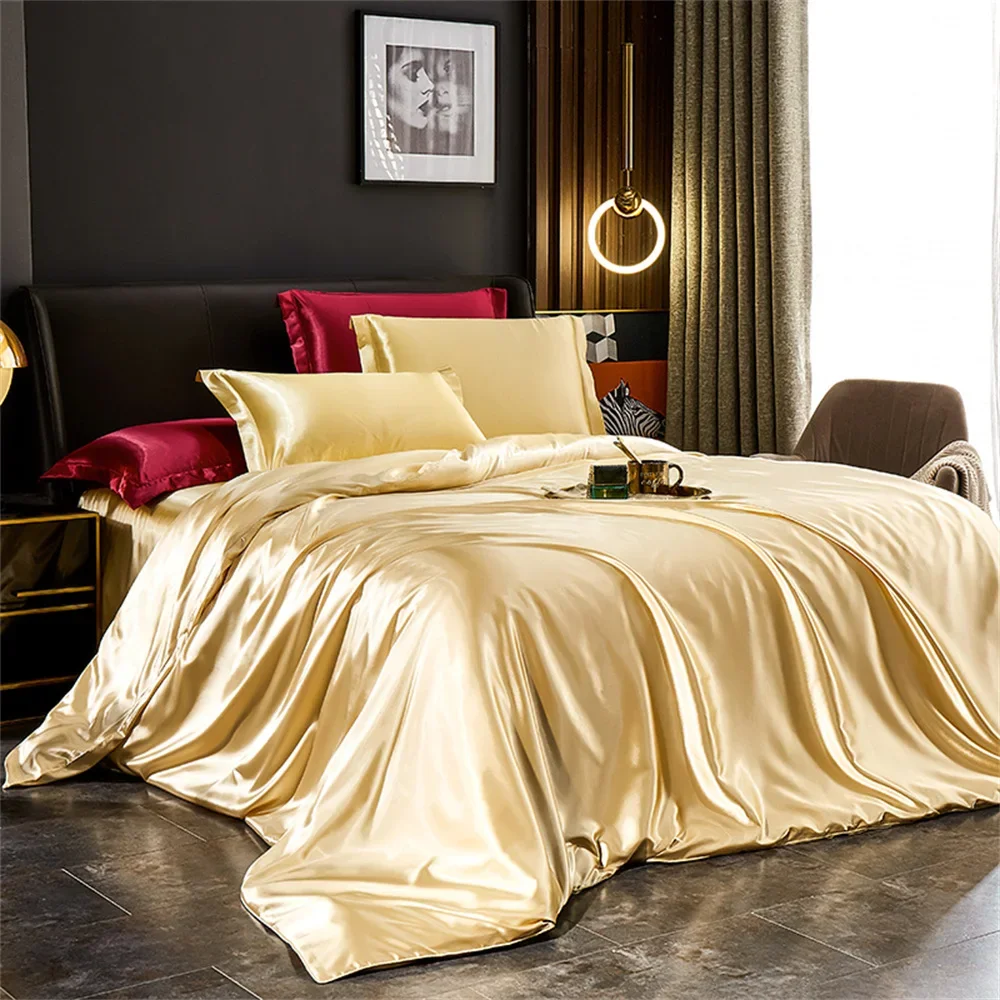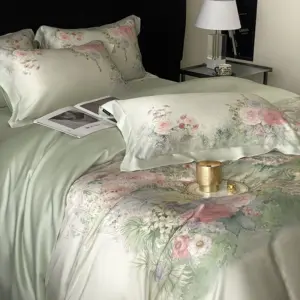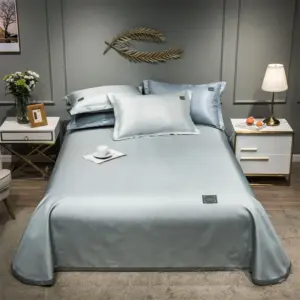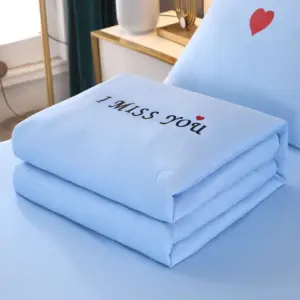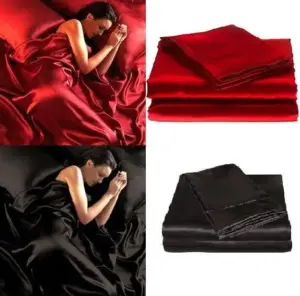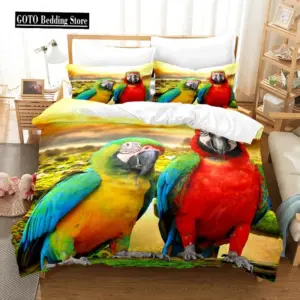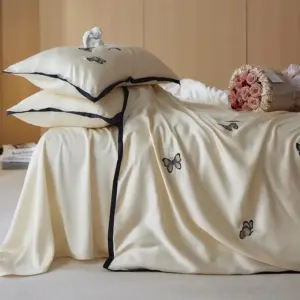1. The Evolution of Silk Alternatives: Cruelty-Free Luxury for Modern Bedrooms
For centuries, traditional silk has been coveted for its unparalleled luxury, smooth texture, and natural sheen. The material offers exceptional benefits including temperature regulation, moisture-wicking properties, and gentle interaction with skin and hair. However, many people are unaware that conventional silk production involves a process called sericulture, which unfortunately results in the destruction of silkworms when their cocoons are harvested.
This ethical concern has driven the development of vegan silk alternatives—materials that capture the desirable qualities of silk without involving any animal exploitation. These cruelty-free options have evolved significantly in recent years, offering consumers a way to enjoy luxury bedding that aligns with their values.
The amazing benefits of Mulberry silk sheets have set the standard that vegan alternatives aim to match, including:
- Ultra-smooth texture that reduces friction on skin and hair
- Natural temperature regulation for year-round comfort
- Breathability that helps maintain optimal sleeping conditions
- Hypoallergenic properties ideal for sensitive individuals
Today’s market offers an impressive array of vegan silk bedding benefits that rival traditional silk in both quality and luxury. From plant-based materials like Tencel and bamboo to innovative regenerated fibers and synthetic options, these alternatives cater to conscious consumers seeking ethical luxury.
As the textile industry responds to growing demand for cruelty-free products, vegan silk bedding has become more sophisticated, with options now available at various price points—typically ranging from slightly less than traditional silk to comparable premium pricing, depending on the specific material and quality.
2. Understanding Vegan Silk: What Makes These Alternatives Truly Cruelty-Free
Vegan silk refers to any material engineered to mimic the desirable properties of traditional silk without using animal products or byproducts. These alternatives fall into two main categories: plant-based fibers and synthetic materials, each developed to replicate silk’s distinctive characteristics.
What qualifies a fabric as a true silk alternative goes beyond simply being animal-free. The material must successfully capture several key attributes:
- Distinctive smooth hand-feel and drape
- Subtle lustrous sheen that catches light
- Lightweight yet substantial texture
- Temperature-regulating properties
- Gentle interaction with skin
Modern textile innovation has made remarkable progress in creating silk bedding alternatives through advanced processing techniques. These methods transform natural cellulose fibers or synthetic polymers into materials that closely mimic silk’s molecular structure and surface characteristics.
It’s important to understand that “vegan silk” is not a specific material but rather a category encompassing various alternatives. Each option in our vegan silk bedding collection offers different strengths and unique qualities, allowing consumers to choose based on their specific preferences and priorities.
3. The Ethical and Practical Benefits of Choosing Vegan Silk Bedding
Choosing vegan silk bedding represents both an ethical stance and a practical decision that offers numerous advantages beyond animal welfare considerations.
Ethical Advantages
The primary ethical benefit is the complete avoidance of silkworm exploitation. Traditional silk production typically involves boiling silk cocoons with the pupae still inside, a process that raises significant concerns for those committed to cruelty-free living. Vegan alternatives eliminate this ethical dilemma entirely while still providing luxurious bedding options.
Practical Benefits
Beyond ethics, vegan silk alternatives offer several practical advantages:
Hypoallergenic Properties
Many plant-based silk alternatives are naturally hypoallergenic, making them excellent choices for allergy sufferers. The smooth fiber surface resists dust mites and other common allergens, creating a healthier sleeping environment. These qualities rival or sometimes exceed the benefits of Mulberry silk sheets for sensitive skin.
Temperature Regulation
Like traditional silk, many vegan alternatives excel at temperature regulation. Materials such as bamboo silk sheets naturally wick moisture away from the body and allow air circulation, helping maintain comfortable sleeping temperatures year-round.
Enhanced Durability
Many vegan silk options offer superior durability compared to traditional silk. They typically resist pilling and maintain their appearance through more wash cycles, especially when compared to lower-grade natural silks.
Easier Care
Unlike traditional silk that often requires dry cleaning or delicate hand washing, most vegan alternatives can be machine washed on gentle cycles. This practical advantage saves both time and money over the lifespan of the bedding.
Environmental Sustainability
Many plant-based alternatives use less water and fewer chemicals in production than conventional silk. Materials like Tencel utilize closed-loop production systems that recycle water and solvents, minimizing environmental impact.
Cost-Effectiveness
While premium vegan silk alternatives can match traditional silk in price, many options provide excellent value through their extended lifespan and reduced maintenance costs.
4. Premium Plant-Based Alternatives: Tencel™ Lyocell and Bamboo
Tencel™ Lyocell: The Eucalyptus Silk
Tencel™ Lyocell, often marketed as “eucalyptus silk,” represents one of the most sophisticated vegan silk alternatives available today. Derived from sustainably harvested eucalyptus wood pulp, this remarkable material is produced using a closed-loop system that recycles over 99% of the water and solvents used in production.
What makes Tencel truly stand out is its exceptional smoothness and subtle sheen that closely mimics the luxurious feel of silk. The fiber’s unique structure creates a surface that’s incredibly gentle against skin, with a beautiful drape that rivals high-quality silk fabrics.
Tencel excels in moisture management, absorbing 50% more moisture than cotton while remaining remarkably dry to the touch. This makes it an outstanding choice for temperature regulation, keeping sleepers cool in summer and comfortable in winter.
From an environmental perspective, Tencel carries impressive credentials. The eucalyptus trees require minimal water and no pesticides, while the closed-loop production process has earned Forest Stewardship Council (FSC) certification for its sustainability.
Bamboo Lyocell and Viscose
Bamboo-derived fabrics have emerged as another premium alternative in the eucalyptus silk sheets category, offering silk-like qualities with distinct advantages.
Bamboo Lyocell represents the more sustainable bamboo option, using similar closed-loop processing to Tencel. Bamboo Viscose, while still plant-based, typically involves more chemical processing. Despite their different production methods, both create exceptionally soft fabrics with a luxurious drape.
Bamboo fabrics stand out for their natural antibacterial and odor-resistant properties. The material inherently inhibits bacterial growth, keeping bedding fresher between washings. For hot sleepers, bamboo’s excellent thermal regulating properties provide a cooling effect that many find superior to traditional silk.
As a resource, bamboo grows incredibly quickly without pesticides or fertilizers, requiring significantly less water than cotton. However, the processing methods vary in environmental impact, with Lyocell being the more sustainable choice.
Comparison of Premium Plant-Based Alternatives
| Characteristic | Tencel™ Lyocell | Bamboo Lyocell | Traditional Silk |
|---|---|---|---|
| Feel | Extremely smooth, cool to touch | Very soft with silky drape | Smooth, lustrous |
| Moisture Wicking | Excellent | Very good | Good |
| Temperature Regulation | Excellent | Excellent | Very good |
| Sustainability | Very high (closed-loop system) | High (renewable resource) | Moderate |
| Durability | High | Good to high | Moderate (requires careful care) |
| Care Ease | Machine washable | Machine washable | Typically dry clean or hand wash |
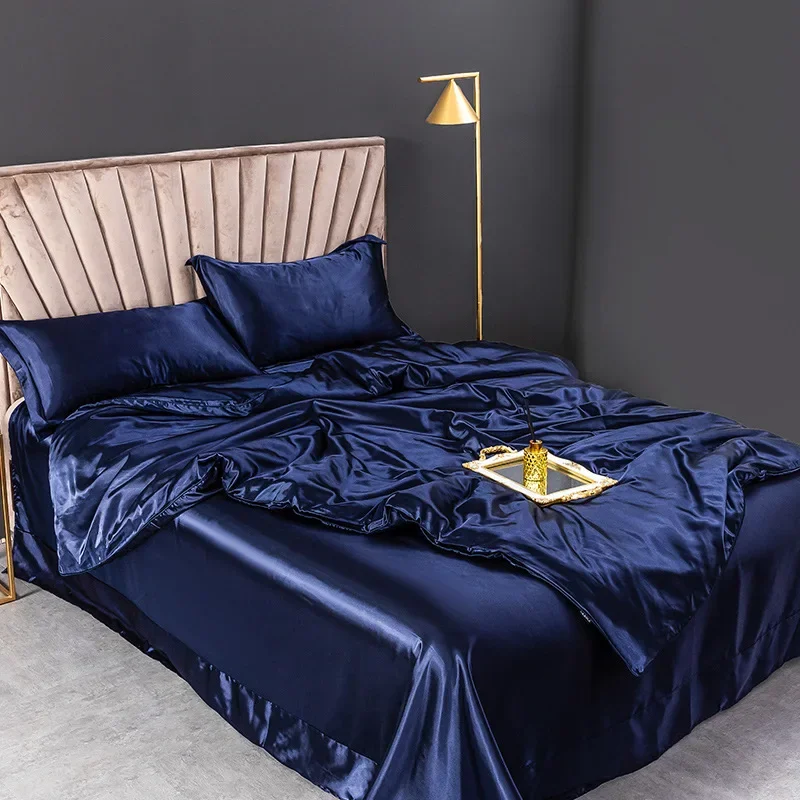
5. Innovative Regenerated Fibers: Cupro and Modal
Cupro: Silk-Like Luxury from Cotton Byproducts
Cupro represents one of the most innovative developments in vegan silk alternatives. This regenerated cellulose fiber is created from cotton linters—the short, fuzzy fibers that adhere to cotton seeds after the longer fibers have been removed for traditional cotton production. Essentially transforming what would be a waste product into luxury fabric.
The production process dissolves these cotton byproducts in a cuprammonium solution (hence the name “Cupro”), which is then extruded into fibers that can be woven into fabric. The result is a material with remarkable characteristics:
- Exceptionally smooth surface with a luxurious drape comparable to heavyweight silk
- Rich, deep sheen that captures light beautifully
- Excellent breathability and moisture-wicking properties
- Protein-like molecular structure similar to silk, making it gentle on skin and hair
- Static-resistant qualities that prevent clinging
Cupro’s smooth surface makes it especially beneficial for those concerned about hair breakage and skin irritation during sleep, offering similar benefits to traditional silk.
Modal: Beechwood Luxury
Modal is another premium regenerated fiber that offers silk-like qualities. Derived primarily from sustainably harvested beechwood, Modal undergoes a specialized processing method that transforms wood pulp into exceptionally soft fibers.
What sets Modal apart from other alternatives:
- Extraordinary softness that actually improves with washing
- Natural sheen that mimics silk’s lustrous appearance
- Exceptional resistance to shrinking, stretching and pilling
- Superior color retention even after numerous washings
- Remarkable breathability combined with effective moisture absorption
- Natural resistance to bacterial growth
Modal’s molecular structure allows it to be incredibly thin yet strong, creating lightweight bedding that feels substantial and drapes beautifully over the body. The material’s natural temperature regulation makes it an excellent choice for bamboo silk bedding sets designed for year-round comfort.
Both Cupro and Modal represent the cutting edge of sustainable luxury in the vegan silk market, offering exceptional quality with reduced environmental impact compared to many synthetic alternatives.
6. Synthetic Options: Vegan Charmeuse and Other Alternatives
Vegan Charmeuse: Silk-Like Synthetics
Vegan charmeuse refers to synthetic fabrics—typically polyester or rayon-based—that are woven in a satin weave to mimic silk charmeuse’s characteristic smooth face and matte back. These materials have become increasingly sophisticated, offering several advantages:
Pros:
* Exceptional visual similarity to silk with characteristic sheen
* Outstanding durability with resistance to pulling and snagging
* Excellent wrinkle resistance requiring minimal ironing
* Wide availability in various colors and patterns
* More affordable price point than most natural alternatives
* Easy care with machine-washable convenience
Cons:
* Generally less breathable than natural alternatives
* Limited moisture-wicking capabilities
* Potential for static build-up
* Environmental considerations regarding synthetic materials
* May not provide the same temperature regulation as natural fibers
Modern polyester satin technologies have improved significantly, with some premium versions incorporating special weaving techniques or finishes that enhance breathability and reduce the “slippery” feeling associated with older synthetic satins.
Other Synthetic Alternatives
Several other options provide silk-like qualities at various price points:
Cotton Sateen: A natural alternative with a silk-like finish achieved through a special weaving technique rather than fiber type. Cotton sateen offers good breathability and becomes softer with washing, though it lacks the distinctive drape of silk.
Microfiber Satin: Ultra-fine synthetic fibers woven to create an exceptionally smooth surface that mimics silk’s hand feel while offering superior durability and stain resistance.
Sustainable Synthetics: Emerging technologies include recycled polyester satin made from post-consumer plastic bottles and bio-based synthetics derived from plant sugars rather than petroleum.
When considering eco-conscious silk bedding options, the environmental impact varies significantly between synthetic alternatives. While traditional polyester has a higher environmental footprint, recycled and bio-based options represent improvements in sustainability while maintaining the practical benefits of synthetics.
7. Material Comparison: How Vegan Silk Measures Up to Traditional Silk
When comparing vegan alternatives to traditional silk, several key factors determine how successfully they replicate the luxury experience while providing their own unique benefits.
Comprehensive Comparison Table
| Characteristic | Traditional Silk | Tencel™/Lyocell | Bamboo | Cupro | Modal | Vegan Charmeuse |
|---|---|---|---|---|---|---|
| Softness | Extremely soft | Exceptionally soft | Very soft | Very soft | Extremely soft | Varies by quality |
| Drape | Excellent | Excellent | Very good | Excellent | Very good | Good to excellent |
| Sheen | High natural luster | Subtle sheen | Moderate sheen | High luster | Moderate sheen | High shine |
| Temperature Regulation | Excellent | Excellent | Excellent | Very good | Very good | Fair |
| Moisture-Wicking | Good | Excellent | Very good | Good | Very good | Poor to fair |
| Breathability | Excellent | Excellent | Very good | Very good | Very good | Fair |
| Durability | Moderate (delicate) | High | Good | Good | Very good | Excellent |
| Care Ease | Challenging | Easy | Easy | Moderate | Easy | Very easy |
| Environmental Impact | Mixed (animal welfare concerns) | Low | Low to moderate | Low | Low to moderate | Moderate to high |
| Average Price Range | Higher | Mid to high | Mid-range | Higher | Mid to high | Lower to mid |
Tactile and Visual Qualities
While no alternative perfectly replicates all aspects of silk, each offers distinctive strengths:
Tencel and Cupro come closest to matching silk’s distinctive drape and flow, with Cupro particularly excelling in recreating the lustrous sheen of high-quality silk. Modal offers perhaps the closest match to silk’s softness against skin, while bamboo provides a slightly more substantial feel with excellent temperature properties.
Synthetic options vary significantly in quality, with premium versions offering impressive visual similarity but typically falling short in the natural breathability that makes silk comfortable year-round.
Performance and Practical Considerations
For hot sleepers, bamboo and Tencel typically outperform traditional silk in moisture management, while providing similar temperature-regulating benefits. For those prioritizing ease of care, all vegan alternatives offer advantages over traditional silk, with synthetic options being particularly low-maintenance.
Durability varies significantly, with most plant-based alternatives offering better longevity than delicate silk fabrics of comparable weight, though high-momme silk (22+ momme) remains exceptionally durable when properly maintained.
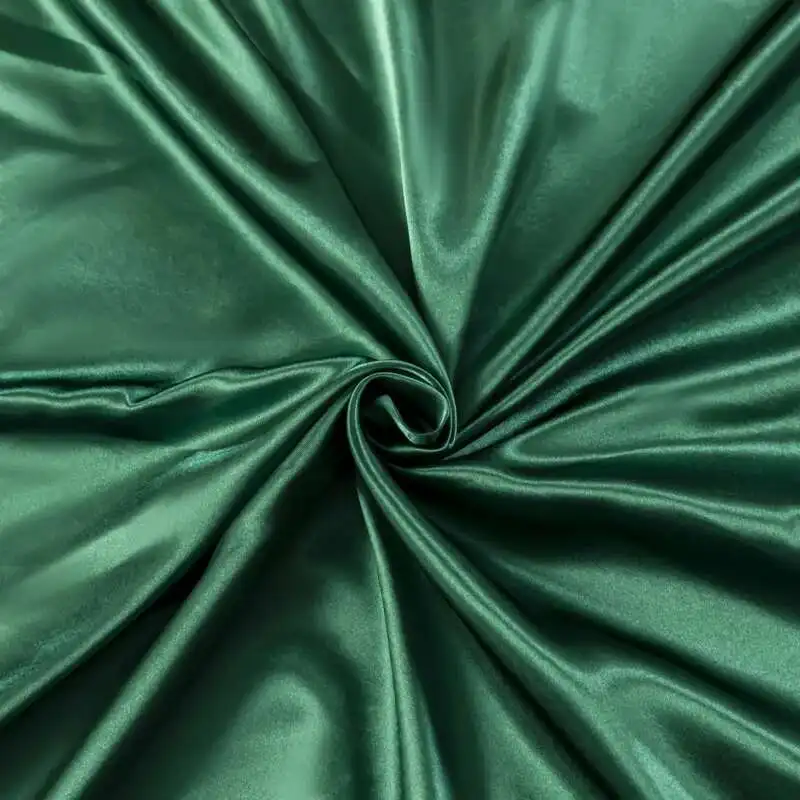
8. How to Select the Perfect Vegan Silk Bedding for Your Needs
Choosing the ideal vegan silk bedding requires understanding your specific priorities and sleep preferences. This decision framework will help match your needs to the most suitable material:
Priority Assessment Considerations
Sleep Temperature Preference:
– Hot sleeper → Bamboo or Tencel (superior moisture-wicking)
– Cold sleeper → Modal or Cupro (better heat retention)
– Variable temperature → Tencel (excellent year-round regulation)
Skin Sensitivity Concerns:
– Very sensitive skin → Modal or Tencel (softest options)
– Allergies → Bamboo (natural antimicrobial properties)
– Eczema or similar conditions → Cupro (protein-like structure similar to silk)
Maintenance Preferences:
– Low maintenance → Vegan charmeuse or Modal (easiest care)
– Eco-conscious care → Tencel or Bamboo (require less frequent washing)
– Willing to provide special care → Cupro (may require more gentle handling)
Environmental Priorities:
– Minimal environmental impact → Tencel (closed-loop processing)
– Renewable resource focus → Bamboo (rapid growth, minimal inputs)
– Recycled materials → Look for recycled polyester satin options
Budget Considerations:
– Premium experience → Cupro or high-grade Tencel
– Mid-range quality → Bamboo or standard Tencel
– Budget-conscious → High-quality vegan charmeuse or cotton sateen
Understanding Product Labeling
When shopping for vegan silk alternatives, be aware of terminology:
– “Silk-like” or “silky” are descriptive terms, not fiber content
– Look for specific fiber names (Tencel™, Lyocell, Modal, etc.)
– Check for fabric composition percentages
– Be wary of ambiguous terms like “bamboo silk” without clarification
For truly complete guide to Mulberry silk bed sheets alternatives, look for these important certifications:
- OEKO-TEX® Standard 100 (ensures testing for harmful substances)
- FSC® certification (for sustainably sourced wood pulp fibers)
- GOTS certification (for organic content in natural fibers)
- Vegan certification or clear vegan labeling
Quality Indicators
Regardless of material, quality construction matters:
– Tight, even stitching with no loose threads
– Smooth, consistent fabric surface without slubs (unless intentional)
– Reinforced corners on fitted sheets
– Deep pockets that fully accommodate mattress height
– Clear care instructions specific to the material
9. Where to Find Quality Vegan Silk Bedding
The growing demand for ethical alternatives has expanded the availability of vegan silk bedding across various retail channels. Understanding where and how to shop ensures you find authentic, high-quality options.
Retail Sources for Vegan Silk Alternatives
Specialty sustainable bedding companies like Sanctuary Soft offer curated selections of premium vegan silk alternatives with transparent sourcing and production information. These specialized retailers typically provide detailed information about fiber content, production methods, and environmental credentials.
Eco-conscious department stores increasingly stock vegan silk options, though selection may be more limited. Look for dedicated sustainable or vegan sections within their bedding departments.
Direct-to-consumer brands have emerged as excellent sources for vegan silk bedding, often offering competitive pricing by eliminating middlemen. Many focus exclusively on specific materials like eucalyptus or bamboo.
Online marketplaces provide the widest selection but require careful scrutiny. Use specific search filters for materials (Tencel, Modal, etc.) rather than just “vegan silk” to find authentic options.
Evaluating Product Claims
When shopping for vegan silk bedding, look for:
– Specific fiber content percentages rather than vague descriptors
– Clear explanation of production methods
– Transparent information about material sourcing
– Certifications from recognized organizations
– Detailed product specifications (weight, thread count, weave)
Eucalyptus Silk Bedding Sets, Eucalyptus Silk Sheets
Price range: $360.24 through $393.60 Select options This product has multiple variants. The options may be chosen on the product page- Price range: $267.82 through $306.55 Select options This product has multiple variants. The options may be chosen on the product page
Bamboo Silk Sheets, Cooling Silk Sheets
Price range: $130.76 through $177.80 Select options This product has multiple variants. The options may be chosen on the product pageBamboo Silk Sheets, Queen Size Silk Fitted Sheet
Price range: $230.24 through $297.88 Select options This product has multiple variants. The options may be chosen on the product page- 100% Bamboo Fiber Parrot Duvet Cover Set – Queen King Twin Size Tropical Bedding for Comfort & StylePrice range: $241.95 through $380.95 Select options This product has multiple variants. The options may be chosen on the product page
Bamboo Silk Bedding Sets, Bamboo Silk Sheets, King Size Silk Pillowcases, Queen Size Silk Pillowcases
Price range: $376.20 through $402.27 Select options This product has multiple variants. The options may be chosen on the product page
Price points for quality vegan silk bedding typically range from slightly less than traditional silk for synthetic options to comparable pricing for premium plant-based alternatives like Cupro and high-grade Tencel. Investment pieces from specialty retailers typically offer superior construction and more sustainable production methods than budget options.
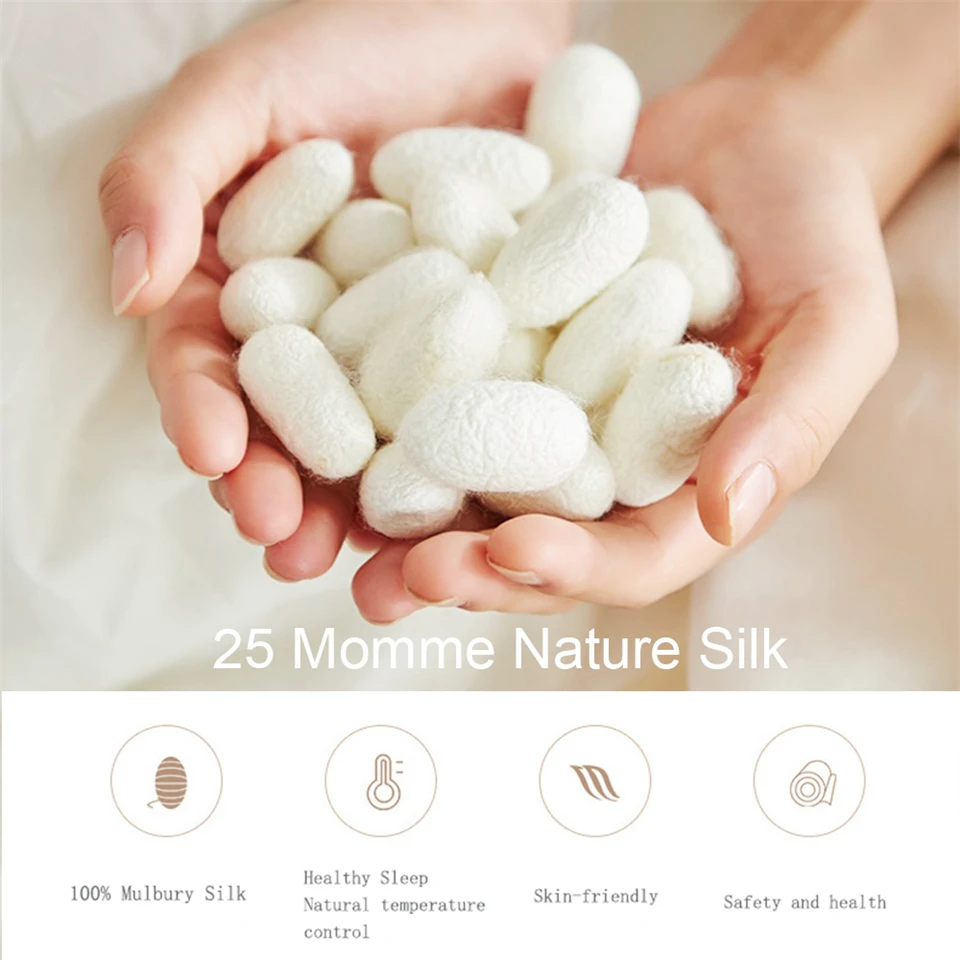
10. Care and Maintenance: Maximizing the Lifespan of Your Vegan Silk Bedding
Proper care significantly extends the life of your vegan silk bedding while maintaining its luxurious qualities. While generally more forgiving than traditional silk, each alternative material benefits from specific care approaches.
General Care Guidelines for All Vegan Silk Alternatives
- Wash before first use to remove any processing finishes
- Use mild, plant-based detergents free from enzymes and brighteners
- Avoid fabric softeners, which can coat fibers and reduce breathability
- Skip bleach and harsh stain treatments
- Remove from dryer promptly or line dry to prevent wrinkles
Material-Specific Care Instructions
Tencel/Lyocell:
– Machine wash in cold water on gentle cycle
– Tumble dry on low heat or line dry
– Remove promptly from dryer to prevent wrinkles
– Iron on low heat if necessary (typically not needed)
– Avoid dryer sheets which can reduce moisture-wicking properties
Bamboo:
– Wash in cold or lukewarm water on gentle cycle
– Use mild detergent without optical brighteners
– Dry on lowest heat setting or air dry
– Remove immediately when slightly damp to prevent wrinkles
– Store folded rather than hanging to prevent stretching
Cupro and Modal:
– Wash in cold water on delicate cycle
– Avoid washing with rough fabrics or items with zippers/hooks
– Tumble dry on low or air dry away from direct sunlight
– If ironing needed, use low temperature setting with steam
– Store in cool, dry place away from direct sunlight
Synthetic Options:
– Machine wash in cool water
– Tumble dry on low heat
– Generally wrinkle-resistant, rarely requiring ironing
– Avoid high heat which can damage synthetic fibers
– Can typically withstand more frequent washing than natural alternatives
With proper care, most vegan silk alternatives maintain their quality for 2-3 years of regular use, with some premium options lasting significantly longer. This longevity, combined with easier care requirements, makes them excellent investments for those seeking silk weave options for hot sleepers without the maintenance challenges of traditional silk.
11. Frequently Asked Questions About Vegan Silk Bedding
Is vegan silk as smooth and cooling as real silk?
Premium vegan alternatives like Tencel, Cupro, and high-quality Modal offer comparable smoothness to traditional silk. For cooling properties, bamboo and Tencel often outperform traditional silk in moisture-wicking, while synthetic options typically don’t regulate temperature as effectively.
What about “peace silk” or “ahimsa silk” – are these truly vegan?
Peace silk or ahimsa silk allows silkworms to emerge from their cocoons before harvesting the silk, avoiding killing them. However, most vegans still consider this non-vegan as it involves the exploitation of silkworms. The cultivation still includes captive breeding and using animals for human benefit, which conflicts with vegan principles.
How do vegan silk alternatives affect skin and hair?
Premium vegan alternatives offer similar benefits to traditional silk. The smooth surface of Tencel, Modal, and Cupro reduces friction on hair and skin, helping prevent bedhead, hair breakage, and sleep creases. Many people with sensitive skin find plant-based alternatives equally gentle compared to traditional silk.
Do vegan alternatives regulate temperature as well as silk?
Plant-based alternatives like bamboo and Tencel excel at temperature regulation, often matching or exceeding traditional silk’s performance. These materials efficiently wick moisture away from the body while maintaining breathability. Synthetic alternatives typically underperform in this area compared to both traditional silk and plant-based options.
Will vegan silk options pill or wear out quickly?
Most vegan silk alternatives offer excellent durability, often exceeding traditional silk in resistance to pilling and wear. Plant-based options like Tencel and Modal maintain their smooth surface through numerous wash cycles, while synthetic options are particularly resistant to damage. The lifespan depends significantly on care practices and quality of construction.
Are vegan silk alternatives actually more sustainable?
Sustainability varies significantly between alternatives. Plant-based options like Tencel (using closed-loop processing) and organic bamboo Lyocell typically have smaller environmental footprints than conventional silk production. Synthetic options generally have higher environmental impacts unless made from recycled materials. When choosing Mulberry silk sheets alternatives, looking for specific environmental certifications provides the best sustainability assurance.

